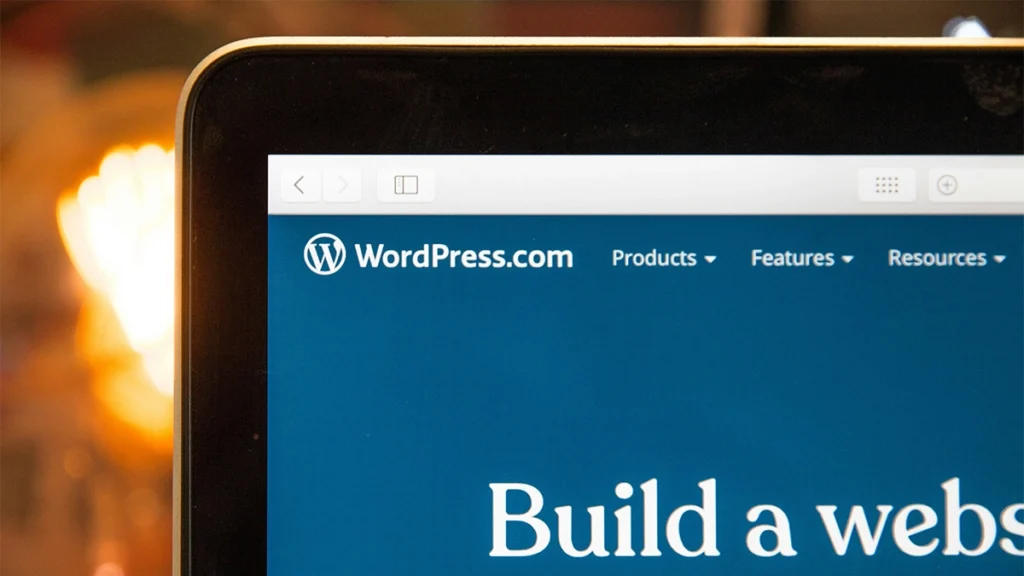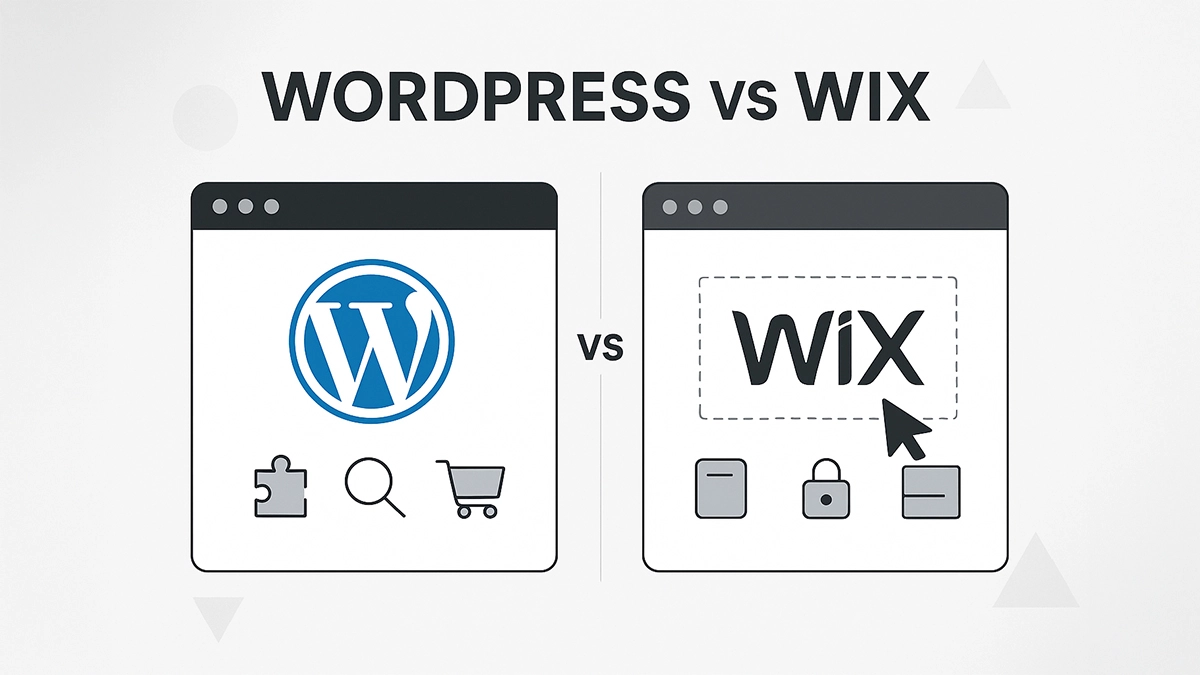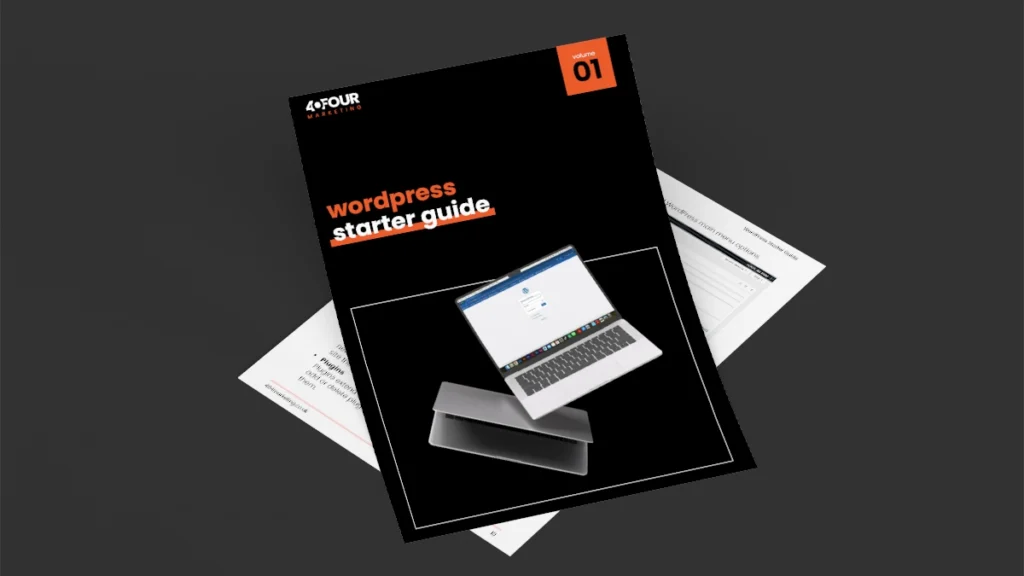Imagine launching your new business, only to find that your website – the cornerstone of your online presence is stuck on a platform that doesn’t suit your needs. The anxiety of making the wrong choice can be overwhelming for small business owners as they pore over options, striving to avoid future limitations or costly changes.
Choosing the right platform for your business website is one of the most important decisions you’ll make when starting out. For many small businesses and startups, the choice often comes down to WordPress versus Wix. Both are popular, user-friendly, and designed to help you get online quickly, but they take very different approaches.
In this guide, we’ll take a deep dive into WordPress vs Wix, comparing them across key areas such as cost, ease of use, design flexibility, SEO, and scalability. By the end, you’ll know which platform is the better fit for your business needs.
Why Your Website Platform Matters
Before we look at WordPress vs Wix, it’s worth taking a moment to understand why this choice is so important. Your website is often the first impression potential customers have of your business. A platform that limits you can make growth harder, while one that’s too complex could overwhelm you at the start.
The right decision depends on your business goals, technical comfort, and long-term plans. With that in mind, let’s compare WordPress and Wix head-to-head.
| Criteria | Winner |
|---|---|
| Ease of use | Wix |
| Design & flexibility | WordPress |
| Features & plugins | WordPress |
| SEO capabilities | WordPress |
| E-Commerce | WordPress |
| Pricing | Tie |
| Ownership and Control | WordPress |
| Security | Wix |
| Support | Wix |
| Scalability | WordPress |
What Is WordPress?

WordPress is the world’s most popular content management system (CMS), powering over 40% of all websites globally. (“WordPress Market Share, Statistics, and More”, 2025) There are two versions:
- WordPress.org – free, open-source software that you host yourself. This is the version we’re comparing here.
- WordPress.com – a hosted platform with fewer customisation options.
With WordPress.org, you install the software on your own web hosting and have full control over your website. It’s flexible, powerful, and ideal for businesses that want to scale.
read more
WordPress starter guide
What Is Wix?
Wix is a cloud-based website builder designed to make creating a website as simple as possible. It offers drag-and-drop design, built-in hosting, and a range of templates. Wix is particularly appealing to beginners because you don’t need technical knowledge to get started.
Unlike WordPress, which relies on themes and plugins, Wix is an all-in-one solution. You log in, build your site, and publish—all from the same platform.
WordPress vs Wix: Ease of Use
When comparing WordPress vs Wix, ease of use is one of the first things business owners think about.
- Wix:
Designed with simplicity in mind. You can choose a template and start dragging and dropping elements straight away. No coding knowledge is required, making it ideal for beginners. - WordPress:
Slightly steeper learning curve. You’ll need to set up hosting, install a theme, and add plugins. However, once it’s configured, the WordPress editor is straightforward to use.
Winner: Wix for beginners. But if you’re willing to invest a little time in learning, WordPress quickly catches up.
WordPress vs Wix: Design and Flexibility
Your website design should reflect your brand. This is where WordPress vs Wix starts to show real differences.
- Wix:
Offers over 800 pre-made templates. These look modern and can be customised using the drag-and-drop builder. However, once you’ve chosen a template, you can’t switch to another without rebuilding your site. - WordPress:
Thousands of themes (free and paid) are available. You can switch themes whenever you like, and with tools like Elementor or Gutenberg, you get drag-and-drop editing too. Additionally, most WordPress themes are designed to be fully responsive, meaning they automatically adjust to different screen sizes like mobile phones and tablets, ensuring a consistent user experience. This is achieved through customizable breakpoints and mobile-specific optimizations within the themes, allowing business owners to maintain a professional appearance across all devices.
In terms of flexibility, WordPress is unlimited—you can build anything from a simple brochure site to a complex e-commerce platform. Wix is more restrictive once you want custom features.
Winner: WordPress for flexibility and scalability.
WordPress vs Wix: Features and Plugins

No website platform can offer every feature out of the box. That’s where plugins and add-ons come in.
- Wix:
Has an App Market with around 300 apps covering things like booking forms, live chat, and social media feeds. These are simple to add but limited compared to WordPress. - WordPress:
Offers over 60,000 free plugins and thousands of premium ones. Whether you want advanced SEO, membership systems, or e-commerce tools, there’s a plugin for it.
Winner: WordPress for the sheer range of options.
WordPress vs Wix: SEO Capabilities
If you want your website to be found on Google, SEO (search engine optimisation) is key.
- Wix:
Includes basic SEO features such as meta titles, descriptions, and alt text for images. It also integrates with Google Search Console. However, customisation is limited, and advanced SEO strategies can be harder to implement. - WordPress:
Known for being SEO-friendly. With plugins like Yoast SEO or Rank Math, you can optimise every aspect of your site. You can also take advantage of fast hosting, caching plugins, and advanced site structures for better performance.
Winner: WordPress for businesses that want to grow their online presence.
WordPress vs Wix: E-Commerce
If selling online is part of your plan, you’ll want to consider how each platform handles e-commerce.
- Wix:
Offers built-in e-commerce features on higher-priced plans. It’s fine for smaller shops with simple products, but it’s limited in payment gateways and customisation. - WordPress:
With WooCommerce (a free plugin), you can create a fully customisable online shop. It supports everything from physical products to subscriptions and digital downloads. You can also integrate with almost any payment provider.
Winner: WordPress for serious e-commerce businesses. Wix is better for hobby stores or small catalogues.
Looking for help to setup your e-commerce store?
Check out our web design services
WordPress vs Wix: Pricing
Cost is always an important factor for small businesses.
- Wix:
Plans start at around £10/month, including hosting. Business and e-commerce plans are more expensive, typically £15–£25/month. The advantage is predictable pricing. - WordPress:
The software itself is free, but you’ll need hosting (usually £5–£20/month), a domain name, and potentially paid themes or plugins. Costs can vary depending on what you need.
At first glance, Wix looks cheaper and simpler. But in the long term, WordPress often provides better value because you’re not tied to a single provider.
Winner: Tie—Wix for simplicity, WordPress for long-term scalability.
WordPress vs Wix: Ownership and Control
This is an area many small businesses overlook.
- Wix:
Your website is hosted on Wix’s servers. If you want to move your site elsewhere, you can’t—migration is extremely limited. Essentially, you don’t own the platform. - WordPress:
You own your website files and database. You can move your site to any hosting provider at any time. This gives you full control over your digital assets.
Winner: WordPress, hands down.
WordPress vs Wix: Security

Security is vital for every business website.
- Wix:
Handles security for you, including SSL certificates and updates. This is convenient if you don’t want to think about maintenance. - WordPress:
You’re responsible for updates, backups, and security measures. However, with the right hosting and plugins, you can achieve enterprise-level security.
Winner: Wix for beginners who want simplicity. WordPress requires more responsibility, but it can be more secure with proper setup.
WordPress vs Wix: Support
If you get stuck, support can make all the difference.
- Wix:
Provides 24/7 customer support via chat and phone. - WordPress:
Support comes from your hosting provider and the wider community. Premium themes and plugins often include their own support channels.
Winner: Wix for direct customer service. WordPress relies more on forums, tutorials, and third-party providers.
WordPress vs Wix: Scalability
As your business grows, your website needs to keep up.
- Wix:
Great for small websites, but it can feel limiting as you expand. Advanced features and large-scale customisation are difficult to achieve. - WordPress:
Scales easily, from small business websites to global brands. You can add features, redesign, and upgrade hosting as you grow.
Winner: WordPress for businesses with long-term ambitions.
Pros and Cons of WordPress vs Wix
To make things clearer, here’s a quick summary:
Wix
| Wix Pros | Wix Cons |
|---|---|
| Easy to use | Limited flexibility |
| All-in-one solution | Can’t move your site elsewhere |
| Includes hosting and security | Not ideal for complex e-commerce or SEO |
| 24/7 support |
WordPress
| WordPress Pros | WordPress Cons |
|---|---|
| Full ownership and control | Requires more setup |
| Thousands of themes and plugins | Ongoing maintenance is your responsibility |
| Excellent SEO and scalability | Support isn’t centralised |
| Perfect for e-commerce |
Looking to get your business online?
Check out our web design services
So, WordPress vs Wix: Which Should You Choose?
If you’re a startup or small business looking for the quickest, easiest way to launch a simple site, Wix is a solid choice. It’s beginner-friendly, comes with built-in hosting, and requires no technical knowledge.
However, if you want a website that grows with your business, offers advanced SEO, and gives you complete control, WordPress is the better option. While it requires more effort up front, the long-term benefits outweigh the initial learning curve.
Final Thoughts
When it comes to WordPress vs Wix, the best platform depends on your goals. If you want convenience, choose Wix. If you want flexibility and growth, choose WordPress.
At 404 Marketing, we work with small businesses and startups every day, helping them get online with solutions that match their budget and ambitions. To guide you in choosing the perfect platform, we invite you to book a 15-minute platform fit session with us today. This small step can quickly illuminate the best path forward in achieving your business goals.Your website is the foundation of your online presence. Make sure you build it on the right platform.


